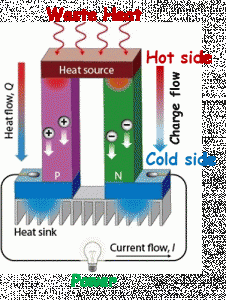
More than 40% of energy in fossil fuels is lost in the form of ‘heat’ during different conversion processes. This results in not only inefficient usage of natural resources but also leads to environmental and water pollution. One of the techniques that can be used to recover this ‘waste heat’ is via a ‘thermoelectric generator’ which has no moving parts and converts heat directly into electrical power. Our research is focused on developing suitable materials for this purpose with the aim that they have high conversion efficiencies. The target is to develop materials that can harvest both ‘low grade’ and ‘high grade’ waste heat generated in automobiles to steel plants and cement factories. An added advantage is that these materials and technology can also be used for electrical power generation in deep space probes which are far away from the Sun and hence cannot rely on solar power generation.The conversion efficiency or the figure-of-merit of the material depends on electrical conductivity,thermal conductivity and thermopower. The dependence on these parameters is non-trivial and hence needs to be optimised. The research uses different strategies for this optimisation like compositional engineering and microstructural engineering. Different classes of materials varying
from Clathrates, Skutterudites, half-Heuslers and oxides are being investigated which can be used for harvesting low as well as high temperature waste heats.
Prof. S Vitta
